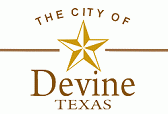The City of Devine is facing the possibility of financing a $1.4 million water meter replacement project on its own after being denied funding from the Texas Water Development Board (TWDB).
Interim City Administrator Dora Rodriguez broke the news at the City Council meeting held last Tuesday, Feb. 19, that the TWDB erroneously disregarded surveys completed by Devine residents when ranking cities requesting funding. The TWDB ranks cities based on their need.
“We were ranked 54,” Rodriguez said, “and so by the time they distributed the money, we weren’t going to be getting anything.”
The City’s 1,700 water meters are at the end of their lifespan, with around 700 of them not registering any water usage. That endangers the City’s ability to collect sufficient revenue to make payments on the more than $9 million in TWDB loans it was awarded in 2018 to fund the replacement of asbestos concrete water pipes throughout the City.
Andrew Friedman, one of the City’s financial advisors from SAMCO Capital Markets, was on hand to brief Council about the situation and the available options for replacing the water meters.
 “You have a lot of people who are paying just the base rate for their water, regardless of how much water they’re using,” Friedman said. “We have financed many, many, many of these water meter projects across the state. Your billing will go up, sometimes very substantially, because now you’re actually registering all the water that you’re selling, rather than just giving it away for nearly free.”
“You have a lot of people who are paying just the base rate for their water, regardless of how much water they’re using,” Friedman said. “We have financed many, many, many of these water meter projects across the state. Your billing will go up, sometimes very substantially, because now you’re actually registering all the water that you’re selling, rather than just giving it away for nearly free.”
HydroPro, the company selling the new meters, provided the City with interest rates for both 10-year and 12-year lease-purchase agreements, though Friedman advised against that route.
“It’s our opinion that you get a lower interest rate when the City of Devine borrows money on its own merit through either a tax note or certificate of obligation as you have previously,” Friedman said. “I feel very comfortable that you all would be better off borrowing on your own, rather than with the lease-purchase route.”
Friedman recommended matching the duration of the debt to the useful life of the meters, which feature a 10-year full warranty and a 40 percent warranty thereafter.
An option available to the City is to cash in a CD in order to put that money towards the tax note or certificate of obligation, essentially buying down the amount of debt to be financed.
“I would recommend given the projects that we have going on from our prior Water Development Board projects that sitting on your cash may be the more prudent move right now until those projects are completed,” Friedman said. “Because certainly you wouldn’t want to find yourself having bids come in on one of those projects higher than expected, and then not having the cash and just having to go to the market again.”
District 5 Councilman Cory Thompson asked if the utility rates would have to be raised again in order to finance the meter replacement.
“Given the nature that these water meter projects tend to increase revenues and help pay for themselves, I think – without knowing exactly what your 2019 budget looks like at the moment – that you’ll be able to absorb this without any need for a rate increase,” Friedman said.
Council can still choose to reapply for help from the TWDB in March, though Friedman said money wouldn’t be awarded until August, or disbursed until September or October.
“In all likelihood, you wouldn’t receive the full amount,” Friedman said. “I can almost guarantee that just knowing there are other communities in more need. You might expect a few hundred thousand dollars off that $1.4 million.”
A motion by District 4 Councilwoman Jennifer Schott and District 3 Councilman David Espinosa to allow Friedman to consider options for the water meter project passed 4-0, with Thompson and District 2 Councilman Steve Lopez also voting aye.
District 1 Councilman David Valdez was absent.
“I know that we’ve had these meters since way back,” Rodriguez said, “and they’re at the end of their life. They’re past the end of their life, and we need to do something, because water is our revenue.”
By Marly Davis
Staff Writer
Funding denial may force City to cover $1.4 million water meter project

